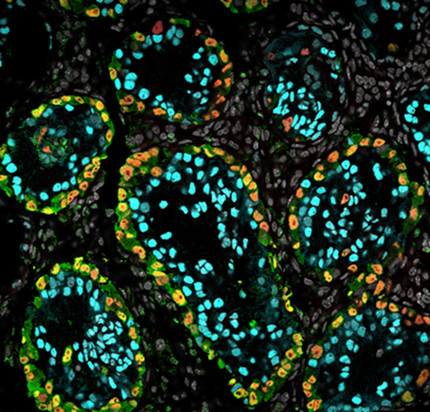Home > News > iPSC Protocol Opens the Door to Explore Male Infertility Treatments
iPSC Protocol Opens the Door to Explore Male Infertility Treatments
- Amsbio reports how the Sasaki Lab within the School of Veterinary Medicine at the University of Pennsylvania (USA) devised a protocol in which induced pluripotent stem cells (iPSCs) could be utilized to produce reconstituted human testes.
Since the original 2020 publication of their groundbreaking research, Dr Kotaro Sasaki’s team has made significant progress in reconstituting human testis-like tissue from iPSCs.

Immunofluorescence image of 1-month xenogeneic reconstituted testes (xrTestis) showing GFP (indicating TFAP2C-EGFP reporter expression, green), TFAP2C (red), and SOX9 (cyan), merged with DAPI staining (white). SOX9 marks mouse Sertoli cells. Scale bars: 50 μm. These xrTestes stably maintained structural organization for up to 7 months and exhibited progressive differentiation of iPSC-derived germ cells. Courtesy: Dr Kotaro Sasaki.
A 2025 blog update describes a new protocol for generating xenogeneic reconstituted testes (xrTestes) that support human spermatogonial development in vitro. These findings strengthen the potential of the Sasaki Lab system as a valuable model for studying early human spermatogenesis and offer a practical and scalable platform for further research in reproductive biology. The strides made by researchers in the Sasaki Lab are paving a new way for studies to explore treatments for male infertility.
To support reproductive biology research, Amsbio offers a wide range of reagents for stem cell culture, differentiation, and 3D tissue modelling.
The Sasaki Lab chose to use StemFit® feeder-free, chemically defined stem cell culture media from Amsbio to maintain their iPSC culture. In addition, the xrTestes cells were cultured on plates coated in recombinant laminin E8 fragments using iMatrix-511 silk from Amsbio. The Sasaki lab also cryopreserved their cells using CELLBANKER 1 from Amsbio, a trusted solution for the storage of any cell type including sensitive cell lines. CELLOTION™ cell wash and recovery solution from Amsbio was also used by the lab to collect FACS-sorted in vitro cells prior to single-cell RNA-seq library preparation.
To learn more about the Sasaki Labs most advances in developing reconstituted human testes cells from iPSCs read the full 2025 blog update at https://www.amsbio.com/news/reconstituting-human-testes-from-ipscs For further information on Stem Cell Synergy Solutions from Amsbio please visit https://www.amsbio.com/research-areas/stem-cells or contact the company on +31-72-8080244 / +44-1235-828200 / +1-617-945-5033 / info@amsbio.com.
Now part of the Europa Biosite group of companies, AMS Biotechnology (Amsbio) is recognized as a leading transatlantic company contributing to the acceleration of discovery through the provision of cutting-edge life science technology, products, and services for R&D in the medical, nutrition, cosmetics, and energy industries. Amsbio has in-depth expertise in extracellular matrices to provide elegant solutions for studying cell motility, migration, invasion, and proliferation. This expertise in cell culture and the ECM allows Amsbio to partner with clients in tailoring cell systems to enhance organoid and spheroid screening outcomes using a variety of 3D culture systems, including organ-on-a-chip microfluidics. For drug discovery research, Amsbio offers assays, recombinant proteins, and cell lines. Drawing upon a huge and comprehensive biorepository, Amsbio is widely recognized as a leading provider of high-quality tissue specimens (including custom procurement) from both human and animal tissues. The company provides unique clinical grade products for stem cells and cell therapy applications. This includes GMP cryopreservation technology, and high-quality solutions for viral delivery.
---------------------
Worldwide HQ
AMS Biotechnology (Amsbio)
184 Milton Park
Abingdon
Oxon OX14 4SE
UK
Tel: +44-1235-828200
Fax: +44-1235-820482
Email: info@amsbio.com
Web www.amsbio.com
North American HQ
Amsbio LLC
1035 Cambridge Street
Cambridge
MA 02141
USA
Tel: +1.617.945.5033
Tel: +1.800.987.0985 (toll free)
Email: info@amsbio.com
Web www.amsbio.com
Related News
- Wnt3a Cytokine: A Multidimensional Exploration from Molecular Characteristics to 12/31/2026
- CD146 Antibodies: Targeting Lipid Metabolism and Energy Homeostasis to Intervene 1/23/2026
- Be Prepared for 2026 Weather Extremes Says Cold Chain Technologies 1/23/2026
- MetP Pharma’s Enabling Technology Creates a New Brain-Targeted GLP-1 Opportunity 1/23/2026
- INTEGRA launches lab evolution automation competition 1/22/2026
- SP263: A Key Tool in Immunohistochemical Labeling 1/22/2026
- Quoin Pharmaceuticals Files Breakthrough Medicine Designation Application in Sau 1/21/2026
- Neurizon Secures Global Trademark Protection Across Key Markets 1/21/2026
- CD170 Antibody: How to Block the Tumor Immune Escape Mechanism Mediated by Myelo 1/21/2026
- Effect of iPS Cell Culture Medium on Differentiation Efficiency 1/21/2026


